Conferences & symposiums
2022 Youth Crime Prevention and Sports Colloquium
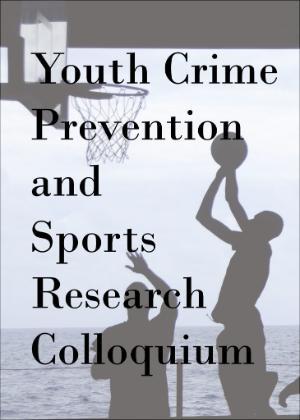 The South Asian Institute hosted the Youth Crime Prevention and Sports Colloquium in partnership with UFV’s Dept. of Kinesiology and the Dept of Criminology and Criminal Justice. The two-day event on November 25 to 26 brought together researchers, scholars, and practitioners to discuss the benefits and drawbacks of sports participation in reducing criminal behaviour. The Colloquium was an extension of recent research under the South Asian Research Fellowship Program and the resulting book by Prof. Yvon Dandurand and Dr. Jon Heidt.
The South Asian Institute hosted the Youth Crime Prevention and Sports Colloquium in partnership with UFV’s Dept. of Kinesiology and the Dept of Criminology and Criminal Justice. The two-day event on November 25 to 26 brought together researchers, scholars, and practitioners to discuss the benefits and drawbacks of sports participation in reducing criminal behaviour. The Colloquium was an extension of recent research under the South Asian Research Fellowship Program and the resulting book by Prof. Yvon Dandurand and Dr. Jon Heidt.
2021 Constructing Heritage in Canada’s South Asian Diasporas
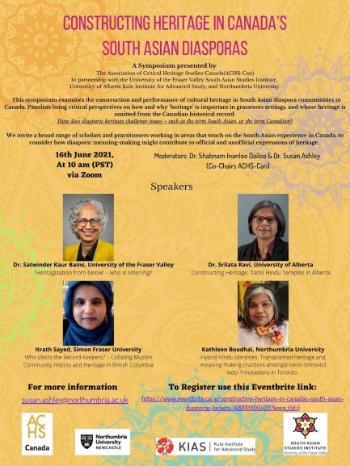 The SASI partnered with the Association of Critical Heritage Studies – Canada, the University of Alberta Kule Institute for Advanced Studies and Northumbria University to present a symposium entitled “Constructing Heritage in Canada’s South Asian Diasporas.” The June 16th symposium, which was attended by almost 50 people, featured panelists: Dr Satwinder Kaur Bains, University of the Fraser Valley; Dr Srilata Ravi, University of Alberta; Itrath Sayed, Simon Fraser University; Kathleen Boodhai, Northumbria University and was moderated by Dr. Shabnam Inanloo Dailoo, Athabasca University and Dr. Susan Ashley, Northumbria University.
The SASI partnered with the Association of Critical Heritage Studies – Canada, the University of Alberta Kule Institute for Advanced Studies and Northumbria University to present a symposium entitled “Constructing Heritage in Canada’s South Asian Diasporas.” The June 16th symposium, which was attended by almost 50 people, featured panelists: Dr Satwinder Kaur Bains, University of the Fraser Valley; Dr Srilata Ravi, University of Alberta; Itrath Sayed, Simon Fraser University; Kathleen Boodhai, Northumbria University and was moderated by Dr. Shabnam Inanloo Dailoo, Athabasca University and Dr. Susan Ashley, Northumbria University.
This symposium examined the construction and performance of cultural heritage in South Asian diaspora communities in Canada. Panelists brought critical perspectives on how and why ‘heritage’ is important in grassroots settings, and whose heritage is omitted from the Canadian historical record.
2020- Fourth Annual Symposium - Caste, Diaspora & the Future with Dr. Suraj Yengde
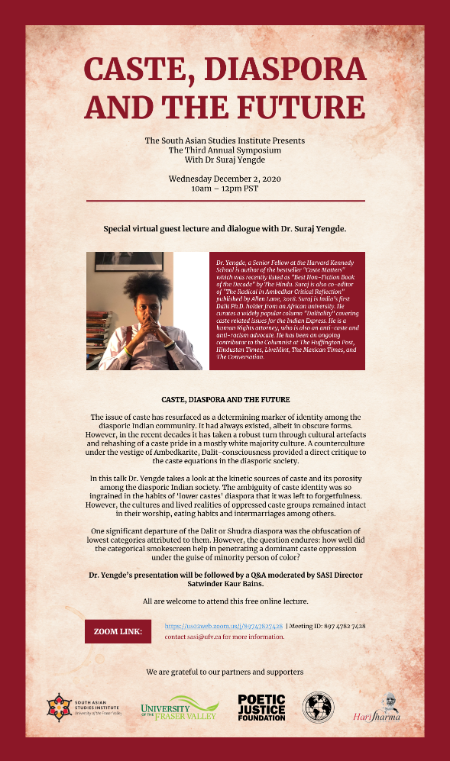
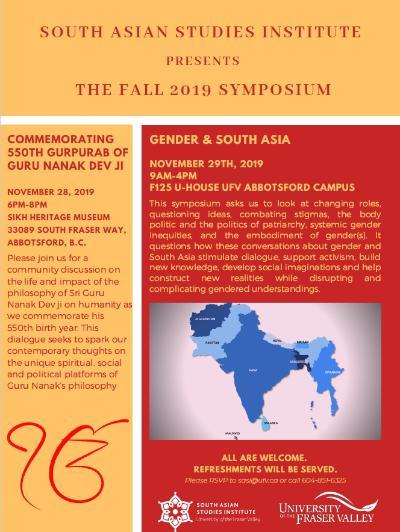
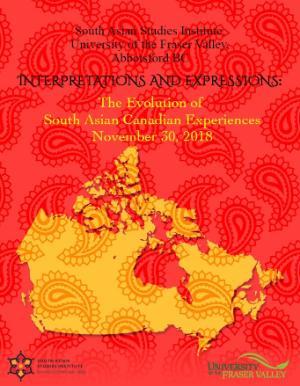 Second Annual Symposium: November 2018, "Interpretations and Expressions: The Evolution of South Asian Canadian Experiences"
Second Annual Symposium: November 2018, "Interpretations and Expressions: The Evolution of South Asian Canadian Experiences"
The South Asian Studies Institute Presented its 2nd Annual Symposium on November 2018. The theme for the symposium, "The Evolution of South Asian Canadian Experiences" looked at ‘South Asia’ as a region part of a complex enigma when it becomes attached to Canadian diaspora experiences. The symposium:
- Critically examined the ways in which specific disciplines reflect, investigate, teach and research South Asia and evolving South Asian Canadian Diaspora experiences and narratives
- Investigated and interpreted the evolution of ways in which South Asian Canadians define, explore and represent themselves as South Asian Canadian
- Responded to whether there are coherent body politics that adopt a taxonomy of 'South Asian Canadian' and the ensuing ramifications
Our aim was to continue the dialogue on the intersections between retrospection, identification,and aesthetic within Canadian teaching, research, performance, critique and translation.
The podcast and presentations from the Symposium are now available online for you to listen to,and access. Please click here to access the audio files.
The second annual symposium included in 'Arts and Culture Rountable' interlude. In this interlude we asked our presenters to speak to the following:
Forward, Backwards, Sideways: Critical Turns in South Asian Canadian Art and Culture
Expressions and interpretations of South Asian Canadian art and culture have proliferated in recent decades. This roundtable discusses the complexities of South Asian Canadian art and culture and how it continues to shift the boundaries of diasporic expression. We invite artists and practitioners to share their insights and experiences on the evolutions, meanings and impacts of South Asian Canadian arts and culture. Join us for an artist and practitioners’ roundtable, as we ask:
- What are the critical turns and movements in South Asian art and culture? How are the boundaries of South Asian art and expression (geographic, political, social, aesthetic, etc.) shifting?
- How is unapologetic creativity and entrance into previously closed spaces created and received?
- In which ways do South Asian Canadian artists and practitioners claim space while moving towards acknowledging our settler histories?
- Where is the institutional and public support for burgeoning South Asian artistic and cultural expression?
- How do South Asian Canadian artists and practitioners explore and represent themselves? For whom and for what purpose?
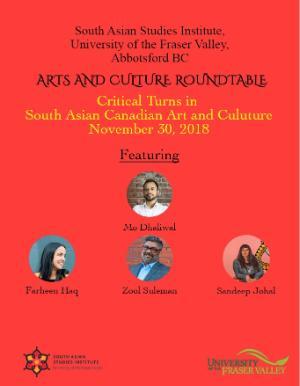
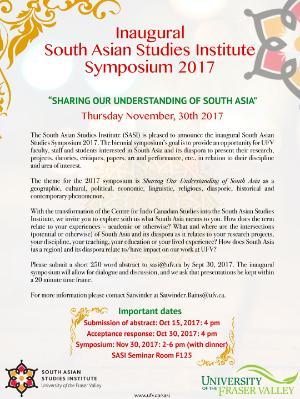
Inaugural SASI Symposium: November 30, 2017: "Sharing Our Understanding of South Asia"
The inaugural SASI Symposium on November 30, 2017, titled " Sharing Our Understanding of South Asia' looked at South Asia as a geographic, cultural, political, economic, linguistic, religious, diasporic, historical and contemporary phenomenon. With the transformation of the Centre for Indo Canadian Studies into the South Asian Studies Institute, we invites presenters to explore with us what South Asia meant to them. We questioned how the term South Asia related to their experiences – academic or otherwise.
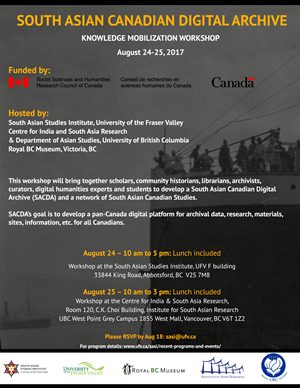 SACDA Knowledge Mobilization Workshop
SACDA Knowledge Mobilization Workshop
The South Asian Studies Institute hosted an SSHRC funded workshop on August 24th and 25th. The workshop brought together scholars, community historians, librarians, archivists, curators, digital humanities experts, and students to develop a South Asian Canadian Digital Archive (SACDA) and a network of South Asian Canadian Studies.
View our SACDA workshop program
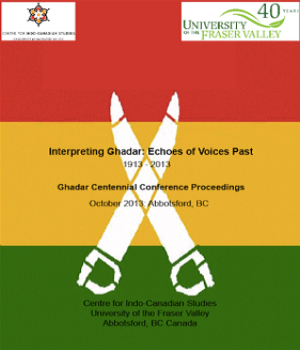 2013 Conference Proceedings: Interpreting Ghadar Echoes of Voices Past
2013 Conference Proceedings: Interpreting Ghadar Echoes of Voices Past
In 2013, the Centre for Indo-Canadian Studies hosted a conference commemorating the centennial of the starting of Ghadar, ie. Mutiny, which was the first anti-Colonial movement to emerge out of India.
Ghadar Conference Proceedings now available online as a PDF. Physical copies are available at the UFV Library.
View Ghadar Resources.
View the Conference Program.
View the Speakers List.
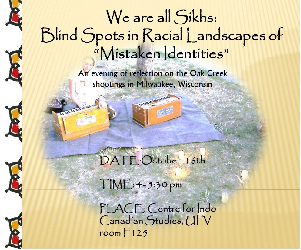 Remembering Wisconsin papers
Remembering Wisconsin papers
On August 5, 2012, an armed gunmen went on a shooting rampage at the Sikh Gurdwara in Oak Creek, Wisconsin. Six people were killed and many other wounded either physically or emotionally. The man's motivation for shooting at the Gurdwara was unequivocally racially motivated. In order to reflect on this tragedy, the Centre for Indo-Canadian Studies hosted a forum titled We are all Sikhs: Blind spots in racial landscapes of “mistaken identities.” on October 16th, 2012. Faculty and staff members took a moment at this juncture to present their thoughts and emotions. View the Wisconsin Paper Abstracts
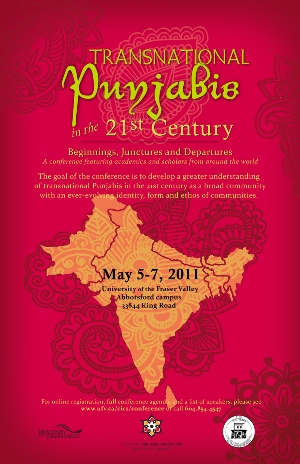 Transnational Punjabis in 21st century: Beginings, Junctures and Departures
Transnational Punjabis in 21st century: Beginings, Junctures and Departures
May 5-7, 2011
University of the Fraser Valley
33844 King Road, Abbotsford, BC
The Centre for Indo Canadian Studies at the University of the Fraser Valley welcomes our colleagues and participants to the TRANSNATIONAL PUNJABIS IN THE 21ST CENTURY: BEGINNINGS, JUNCTURES AND DEPARTURES conference.
A century ago, in 1908 determined pioneers from Punjab India came together against many odds to build one of the first Sikh gurdwaras in North America - the Khalsa Diwan Society Gur Sikh Temple in the small rural community of Abbotsford, BC. The Gurdwara opened in 1911 amidst much fanfare and ceremony. This historically significant gurdwara has since been designated as a National Historic Site by the Canadian Government in 2002 and is the only one of its kind in the Americas to be bestowed with this honour.
In honour of the centennial, the Centre for Indo Canadian Studies at UFV is hosting this international conference. The theme of the conference builds on the concept of juncture as a point of time, especially one made critical or important by an occurrence of circumstances. The conference questions the juncture of transnational Punjabis in their collective realities and imagination in the 21st century and/or departure from accepted norms. We seek to better understand the guide posts for this transnational cultural community in its continuous trajectory of immigrant, settler, citizen, activist, futurist and leader.
The goal of the conference is to develop a greater understanding of Punjabis in the 21st century as a transnational entity with an ever-evolving identity, form and development of communities.
The conference seeks to engage local, national and international scholars on Punjabi Diaspora, Migration, Transnational communities, Religion, Language and Literature, Art and Culture, and Identity and Cultural Politics. Thank you for your contributions to this academic response to 100 years of heritage and for travelling short and long distances to be part of this historic moment in Canadian history.
 The South Asian Institute hosted the Youth Crime Prevention and Sports Colloquium in partnership with UFV’s Dept. of Kinesiology and the Dept of Criminology and Criminal Justice. The two-day event on November 25 to 26 brought together researchers, scholars, and practitioners to discuss the benefits and drawbacks of sports participation in reducing criminal behaviour. The Colloquium was an extension of recent research under the South Asian Research Fellowship Program and the resulting book by Prof. Yvon Dandurand and Dr. Jon Heidt.
The South Asian Institute hosted the Youth Crime Prevention and Sports Colloquium in partnership with UFV’s Dept. of Kinesiology and the Dept of Criminology and Criminal Justice. The two-day event on November 25 to 26 brought together researchers, scholars, and practitioners to discuss the benefits and drawbacks of sports participation in reducing criminal behaviour. The Colloquium was an extension of recent research under the South Asian Research Fellowship Program and the resulting book by Prof. Yvon Dandurand and Dr. Jon Heidt.
 The SASI partnered with the Association of Critical Heritage Studies – Canada, the University of Alberta Kule Institute for Advanced Studies and Northumbria University to present a symposium entitled “Constructing Heritage in Canada’s South Asian Diasporas.” The June 16th symposium, which was attended by almost 50 people, featured panelists: Dr Satwinder Kaur Bains, University of the Fraser Valley; Dr Srilata Ravi, University of Alberta; Itrath Sayed, Simon Fraser University; Kathleen Boodhai, Northumbria University and was moderated by Dr. Shabnam Inanloo Dailoo, Athabasca University and Dr. Susan Ashley, Northumbria University.
The SASI partnered with the Association of Critical Heritage Studies – Canada, the University of Alberta Kule Institute for Advanced Studies and Northumbria University to present a symposium entitled “Constructing Heritage in Canada’s South Asian Diasporas.” The June 16th symposium, which was attended by almost 50 people, featured panelists: Dr Satwinder Kaur Bains, University of the Fraser Valley; Dr Srilata Ravi, University of Alberta; Itrath Sayed, Simon Fraser University; Kathleen Boodhai, Northumbria University and was moderated by Dr. Shabnam Inanloo Dailoo, Athabasca University and Dr. Susan Ashley, Northumbria University.

 Second Annual Symposium: November 2018, "Interpretations and Expressions: The Evolution of South Asian Canadian Experiences"
Second Annual Symposium: November 2018, "Interpretations and Expressions: The Evolution of South Asian Canadian Experiences"

 SACDA Knowledge Mobilization Workshop
SACDA Knowledge Mobilization Workshop 2013 Conference Proceedings: Interpreting Ghadar Echoes of Voices Past
2013 Conference Proceedings: Interpreting Ghadar Echoes of Voices Past Remembering Wisconsin papers
Remembering Wisconsin papers